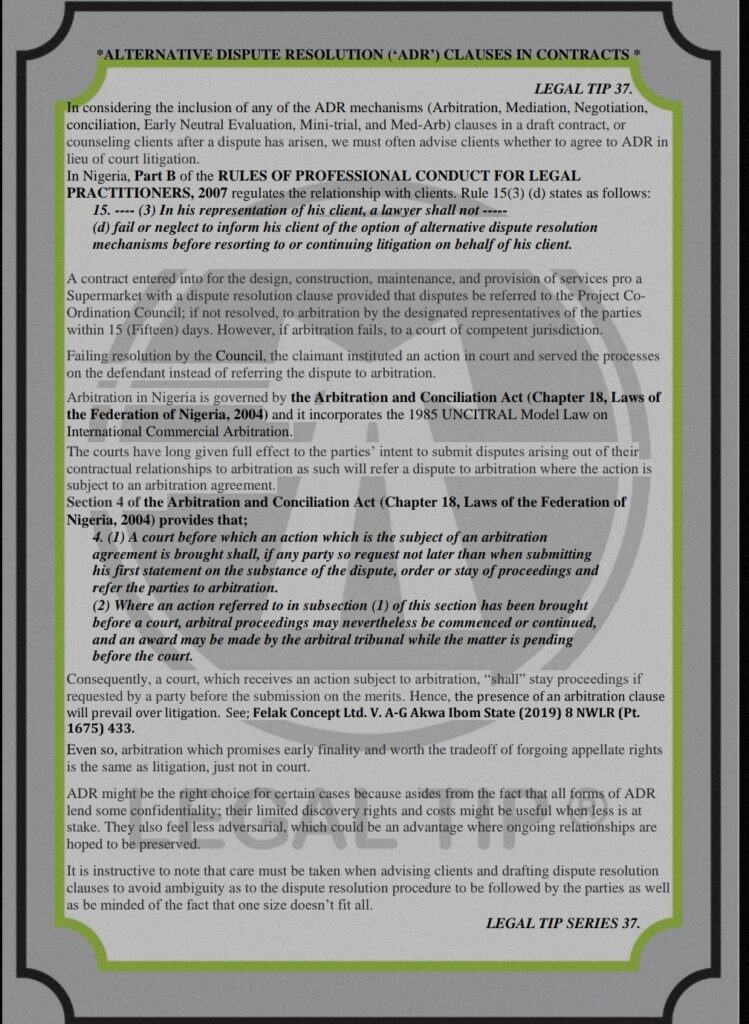In considering the inclusion of any of the ADR mechanisms (Arbitration, Mediation, Negotiation, conciliation, Early Neutral Evaluation, Mini-trial, and Med-Arb) clauses in a draft contract, or counseling clients after a dispute has arisen, we must often advise clients whether to agree to ADR in lieu of court litigation.
In Nigeria, Part B of the RULES OF PROFESSIONAL CONDUCT FOR LEGAL PRACTITIONERS, 2007 regulates the relationship with clients. Rule 15(3) (d) states as follows:
- —- (3) In his representation of his client, a lawyer shall not —–
(d) fail or neglect to inform his client of the option of alternative dispute resolution mechanisms before resorting to or continuing litigation on behalf of his client.
A contract entered into for the design, construction, maintenance, and provision of services pro a Supermarket with a dispute resolution clause provided that disputes be referred to the Project Co-Ordination Council; if not resolved, to arbitration by the designated representatives of the parties within 15 (Fifteen) days. However, if arbitration fails, to a court of competent jurisdiction.
Failing resolution by the Council, the claimant instituted an action in court and served the processes on the defendant instead of referring the dispute to arbitration.
Arbitration in Nigeria is governed by the Arbitration and Conciliation Act (Chapter 18, Laws of the Federation of Nigeria, 2004) and it incorporates the 1985 UNCITRAL Model Law on International Commercial Arbitration.
The courts have long given full effect to the parties’ intent to submit disputes arising out of their contractual relationships to arbitration as such will refer a dispute to arbitration where the action is subject to an arbitration agreement.
Section 4 of the Arbitration and Conciliation Act (Chapter 18, Laws of the Federation of Nigeria, 2004) provides that;
- (1) A court before which an action which is the subject of an arbitration agreement is brought shall, if any party so request not later than when submitting his first statement on the substance of the dispute, order or stay of proceedings and refer the parties to arbitration.
(2) Where an action referred to in subsection (1) of this section has been brought before a court, arbitral proceedings may nevertheless be commenced or continued, and an award may be made by the arbitral tribunal while the matter is pending before the court.
Consequently, a court, which receives an action subject to arbitration, “shall” stay proceedings if requested by a party before the submission on the merits. Hence, the presence of an arbitration clause will prevail over litigation. See; Felak Concept Ltd. V. A-G Akwa Ibom State (2019) 8 NWLR (Pt.
1675) 433.

Even so, arbitration which promises early finality and worth the tradeoff of forgoing appellate rights is the same as litigation, just not in court.
ADR might be the right choice for certain cases because asides from the fact that all forms of ADR lend some confidentiality; their limited discovery rights and costs might be useful when less is at stake. They also feel less adversarial, which could be an advantage where ongoing relationships are hoped to be preserved.
It is instructive to note that care must be taken when advising clients and drafting dispute resolution clauses to avoid ambiguity as to the dispute resolution procedure to be followed by the parties as well as be minded of the fact that one size doesn’t fit all.
LEGAL TIP SERIES 37.



